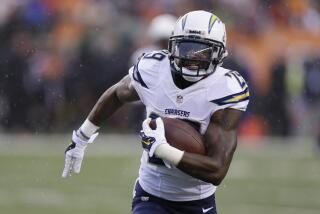Another Key Witness Recants Testimony in Tillman Trial
- Share via
A second eyewitness to a 1996 shooting that left one man dead and another gravely injured appeared to suffer from courtroom memory loss Tuesday at the trial of Olympic heavyweight boxing gold medalist Henry Tillman.
At the crime scene four years ago, Fernando Wright gave police a written statement saying, “I heard shots. I turned around and saw a black car take off. Then I saw a white car driving off. . . . “
But he recanted the statement Tuesday in Superior Court in Santa Monica. “I can’t remember the shots,” Wright told jurors. “I don’t remember hearing no shots.”
Wright also denied seeing the dark Lincoln Continental in the parking lot outside the Townhouse nightclub near Los Angeles International Airport at closing time. He said he was busy trying to pick up women.
“I was looking for a girl. I was kind of walking by myself, looking for a good one,” he testified.
According to police and prosecutors, that black car was driven by Leon Milton, who was shot in the chest but survived. His passenger, Kevin Anderson, was shot in the head and died.
Tillman, who rose from a youth of hardship and crime to become the 1984 gold medalist, is charged with murder and attempted murder in connection with the shooting. After two days of testimony from eight witnesses, prosecutors have yet to place Tillman at the scene of the crime.
Wright struggled visibly to explain his 1996 police statement.
“I don’t know what I mean by it,” he said, referring to his statement. “After reading it over, I’m wondering why. . . . It’s four years ago, understand and, you know, I don’t know why I wrote that statement, you know,” he told the jury under sharp questioning by Deputy Dist. Atty. Mike Duarte.
“I can’t sit here and say I heard shots,” Wright continued. “I can’t remember seeing, hearing that.”
He denied feeling threatened by the presence of Tillman’s brother, Travis, who was seated in the rear of the courtroom.
Prosecutor Duarte suggested strongly by his questioning of Wright and two other witnesses that they were reluctant to testify out of fear of Tillman and his brother.
Despite Duarte’s implications, Judge Steven C. Suzukawa has repeatedly reminded jurors that they have heard no evidence of witness intimidation.
As he left court Tuesday, Travis Tillman said, “I just come to court to support my brother.”
“There is absolutely nothing to indicate that this man has done anything” to intimidate witnesses, defense attorney Al DeBlanc said outside court. “Families have an absolute right to come to court.”
Still, something strange seemed to have come over the prosecution’s first three witnesses. They don’t even agree on the weather.
One witness said the fog that night was so thick he couldn’t see much. Another said he doesn’t remember fog. A third, Murphy Richardson, told police in 1996 that the night was clear but overcast, yet he remembered thick fog by the time he took the witness stand.
Richardson, who initially had placed Tillman at the nightclub on the night of the shooting, partially recanted his testimony Monday, saying that now, four years later, he really couldn’t remember.
So far, the prosecution’s best witness has been Darin Wheeler, the man who accompanied Wright to the club’s comedy night show the night of the shooting.
Wheeler remembered in his testimony that he and Wright were chatting up two women when shouting drew his attention. As he turned to look, he saw a man knock a woman to the ground. Then, he said, he saw large, work-worn black hands point what he believed to be a small revolver or starter pistol and fire.
He initially thought it was a joke. Then the black car sped away, followed by the gunman’s car. A second set of shots was fired and the car turned left, and crashed.
Wheeler and Wright were the first to arrive. Wheeler said he dialed 911 on his cellular phone. Inside the car, the men were moaning and bleeding profusely.
Wright said the driver, Milton, was moaning loudly, pleading for help. The passenger, Anderson, was patting the driver, trying to soothe him, the witness recalled.
Later, a paramedic described Anderson as so combative, he freed himself from a backboard and pulled out his intravenous line and oxygen tubes. Anderson died of a head wound three days after the shooting.
More to Read
Go beyond the scoreboard
Get the latest on L.A.'s teams in the daily Sports Report newsletter.
You may occasionally receive promotional content from the Los Angeles Times.









